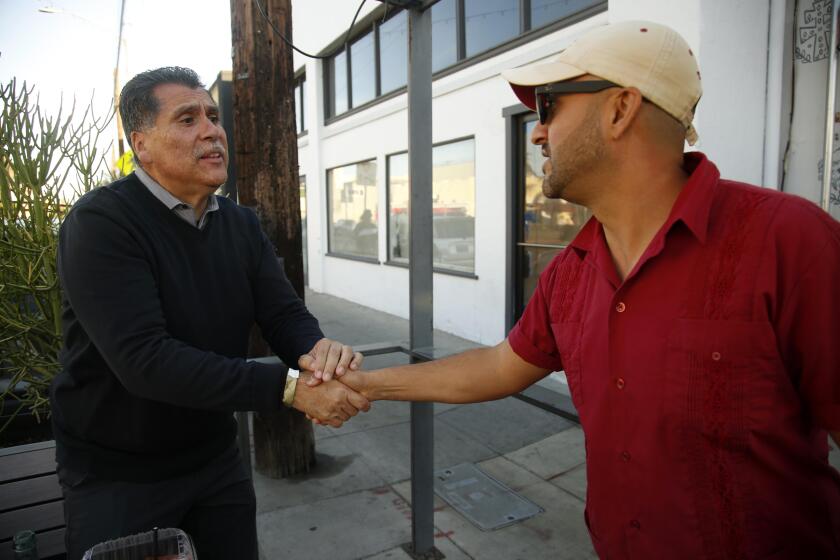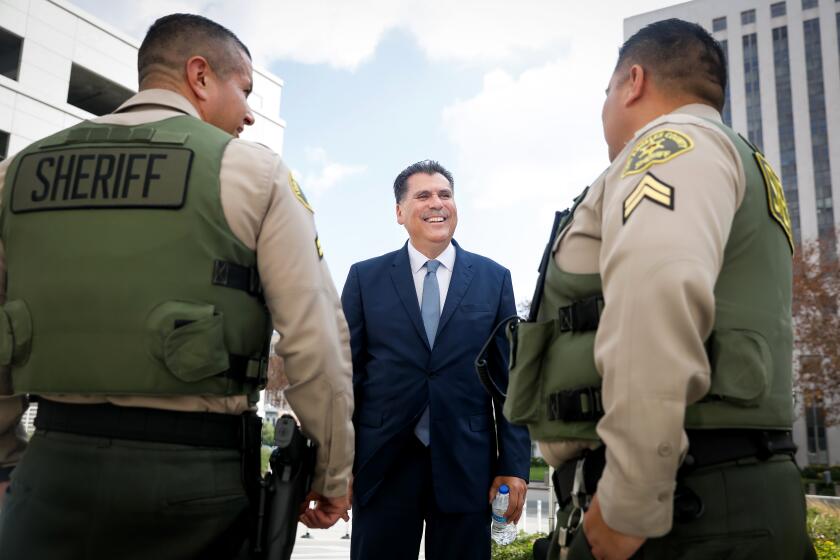Column: How will L.A. County Sheriff Robert Luna solve his department’s many problems?
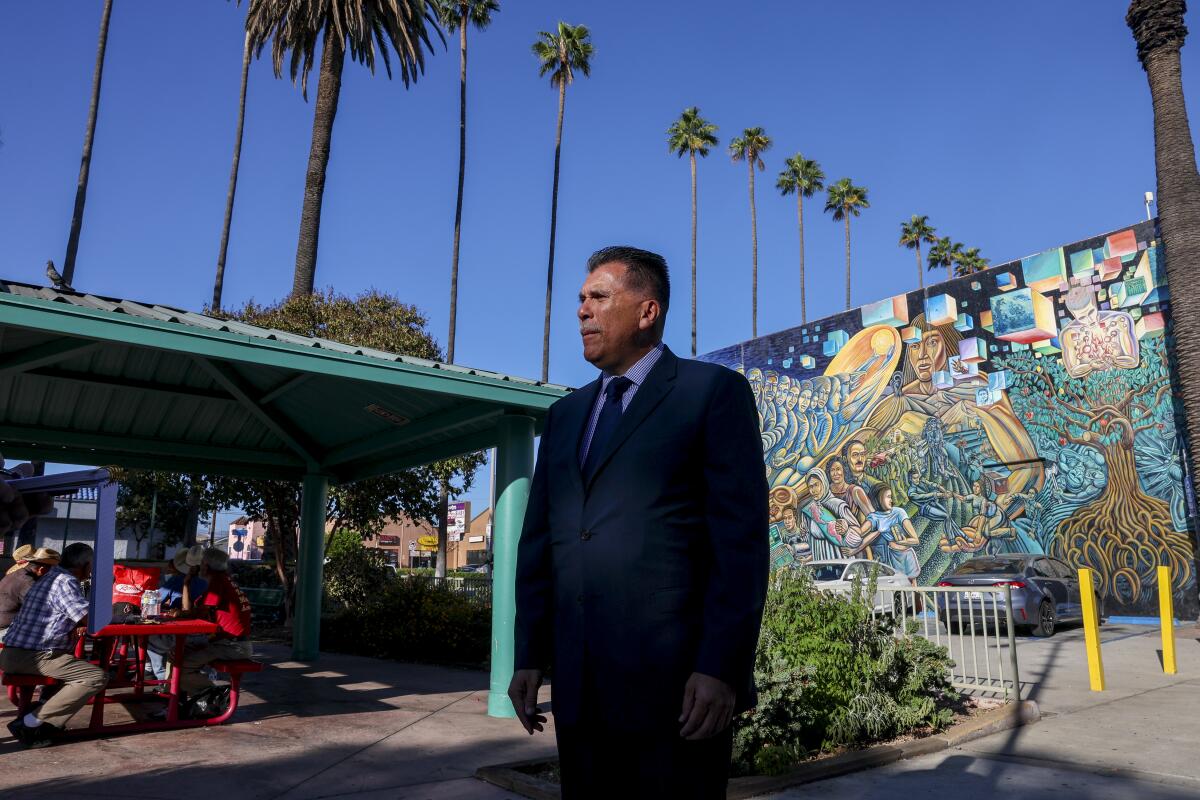
Robert Luna asked a simple question to the roomful of sheriff’s deputies: “What would be the first thing you would do in my shoes?”
At first, the deputies were silent, facing the man who would soon lead them.
Eventually, some spoke up, saying they would like for him to come out to their stations so they could get to know him, Luna recounted to me over a late lunch at Lola’s Mexican Cuisine in Long Beach.
“They go, ‘Hey, a lot of the internal politics — They’ve scared us about you,’” he continued, referring to the regime of his predecessor as sheriff, Alex Villanueva. “‘You know, [that] you are going to change our uniforms. You’re going to make us all get vaccinated. And if we don’t, we’re going to get fired. A whole list of things.’”
The impromptu meeting on Nov. 20, days after Villanueva conceded defeat, came about when the sheriff-elect stopped by the West Hollywood station looking for a place to park on his way to a vigil for victims of the Colorado Springs, Colo., shooting.
Luna knows he’s going to have to win over many of his new employees. He said the meeting reinforced his philosophy on what the scandal-plagued department must do to regain the public’s confidence after four years of chaos under Villanueva.
“I believe in my heart that the majority of people in the L.A. area do support law enforcement, but they want good law enforcement,” he said. “Because nobody wants to have somebody in a position of power appear as if they’re abusing power.”
Incoming L.A. County Sheriff Robert Luna frequently mentions his negative encounters with the department as a teen as motivation for reforming it. Can his strategy succeed?
My previous column on Luna focused on how his upbringing as a working-class Mexican American in East Los Angeles informs his approach. It’s a breath of fresh air to the bunker mentality that nowadays pervades law enforcement.
But one thing I kept going back to during our two-hour conversation was whether Luna, who was Long Beach’s police chief for seven years, can effectively tackle the enormous job before him.
“He’s going from a major city to a super county,” said Jim McDonnell, who was L.A. County sheriff from 2014-18 and also preceded Luna in Long Beach. “You’ve got the largest jail in America, the largest port, largest community colleges, hospitals. Everything you deal with is the largest of its kind.”
“It is huge,” Luna told me near the end of our conversation. “I don’t try and play it down as it’s no big deal. There will be challenges. There’s been challenges there for decades. But there’s good people there. We start taking accountability for ourselves, and I think good things start happening, and we’re going to have a lot of wins.”
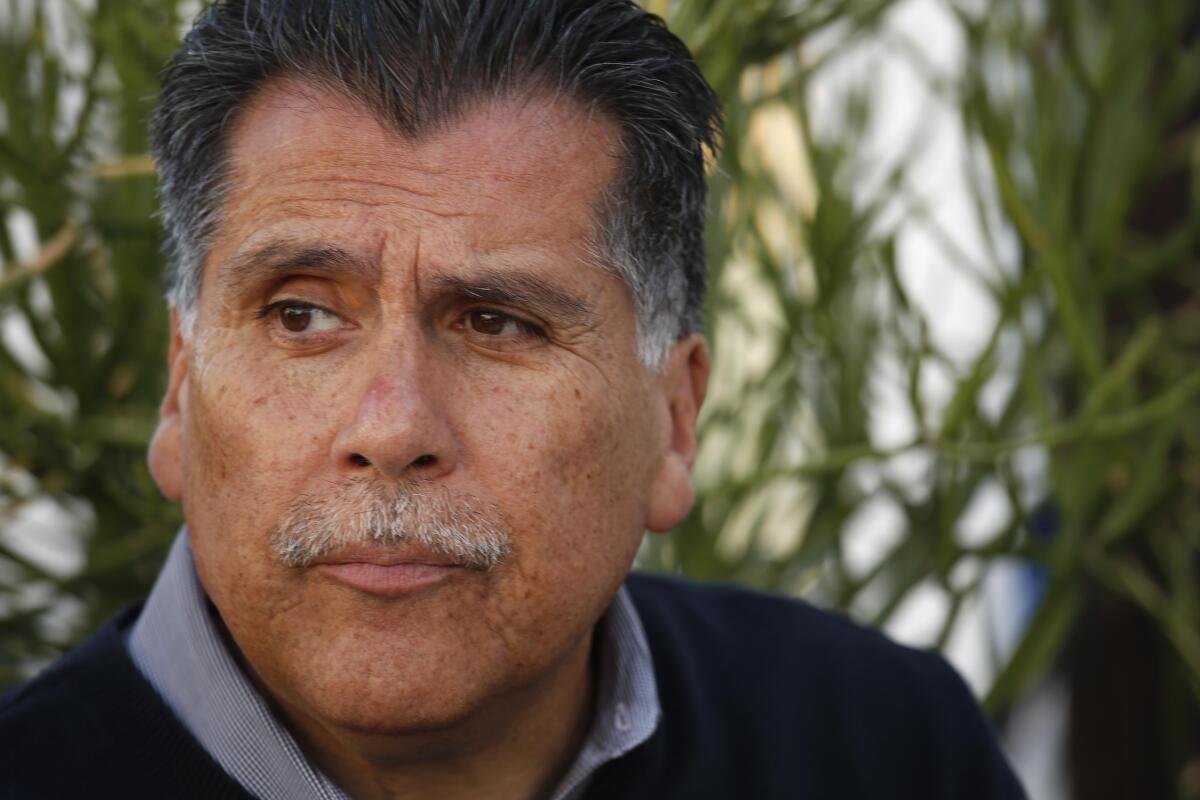
I asked Luna to address three of the Sheriff’s Department’s biggest problems: An us-versus-them mentality that Villanueva exacerbated. A disastrous jail system. And deputy gangs.
On the first point, the 56-year-old described the reaction in the Long Beach Police Department when a gunman ambushed a group of police officers in Dallas in 2016, killing five and injuring nine.
“All the cops [at the department’s West Patrol Station] are glued around the TV, and you could feel the tension in there,” he said. “They’re all, ‘Everybody’s out to get us. They want to kill us. We’re going all-out war.’ And I was like, ‘Time out.’”
Luna told them to calm down and get back to work, with the understanding that the community they were sworn to serve wasn’t the enemy.
“Where, I know for a fact there were other law enforcement leaders saying, ‘Oh, no, let’s batten the hatches. Here’s an extra box of ammunition. You get ready for war out there.’ And it’s like, that’s where I come from. Again, it’s my personal [life] growing up that’s setting that tone. It’s not us versus them, because I was that kid that was ‘them.’”
I asked if that’s what his new department wants to hear right now. He agreed it wasn’t.
“Sometimes, whether you’re in a military-type position, policing position … and they put it all on the line when they go out there, mentally and physically, they want their chief, their sheriff like, ‘Hey, we want somebody who’s going to back us.’ And when it appears you’re not, it’s like, ‘That guy’s not with us. And they do they start looking at you differently.’
“I’m going to tell [L.A. County sheriff’s deputies] what I did in Long Beach,” he continued. “If you’re trying to do the right thing, if something bad happens, I’m going to support you.
“And if you’re not doing something right,” he concluded, “then, well, I’m going to hold you accountable.”
Sheriff-elect Robert Luna faces big challenges when he takes office Monday: building bridges his predecessor Alex Villanueva burned and reforming a department in turmoil.
The Assn. for Los Angeles Deputy Sheriffs, the union that represents the department’s rank and file, endorsed Villanueva over Luna.
In an interview Villanueva gave me earlier this year, he claimed that 80% of the people in his department are “far right.” Mandates, such as requiring employees to get vaccinated, don’t work with “people who are suspicious of the government” and believe in conspiracy theories, said Villanueva, who loudly opposed vaccine mandates.
I asked Luna, a former Republican who campaigned as a progressive, if ideological differences will be an issue.
“When we talk about, you know, some of these individuals who may be way on the right, it’s like, people have got to be back to the center to do this job effectively,” he said. “Maybe I’m naive, but that’s what my expectations are going to be.”
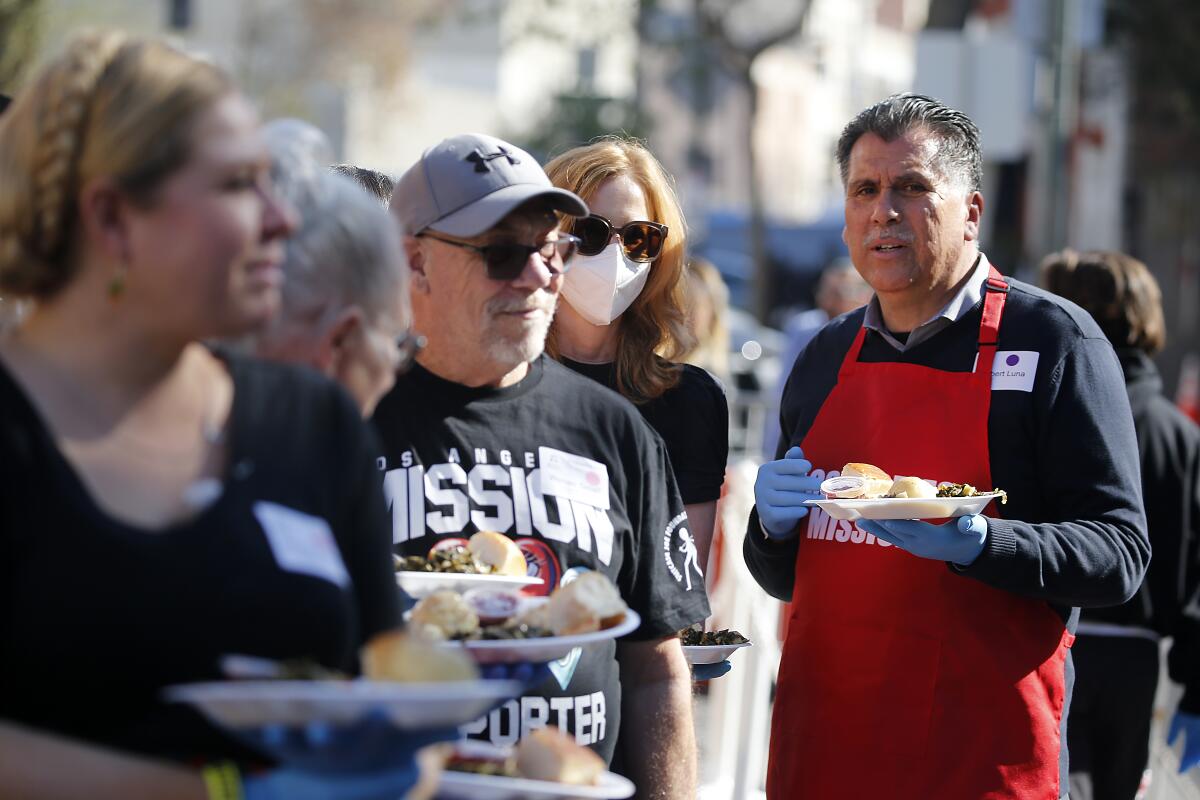
Speaking of accountability, what about the L.A. County jails? The American Civil Liberties Union recently described them as “barbaric,” with some inmates chained to chairs or benches for days — this, after years of federal oversight.
And when a video leaked of a deputy kneeling on an inmate’s head, Villanueva first tried to cover up the incident, then publicly insinuated that my colleague, Alene Tchekmedyian, broke the law by reporting the story.
“We have to be constitutional,” Luna said. “We have to have a reverence for people who are in custody. … We have two consent decrees. From everything I’ve read, the federal monitors are saying things are going the wrong direction.”
He offered the standard progressive line of treating jails as a place not just to hold people but to help them access programs for mental health, addiction, housing and healthcare.
“When you start reading about the population in our facilities, the illiteracy rate is off the charts — like, what the heck?” he said. “That is not an L.A. County jail issue per se. That is a community issue, but it just tells you we have a problem. So what if I could figure out a way to use resources that while people are detained, we start educating people, and if they have learning disabilities, then we have experts that can help us get there?”
It was language that reminded me of former Sheriff Lee Baca, who also championed inmate education and viewed jails as an opportunity to right some of society’s ills. Instead, abuses escalated to the point that the federal government began to investigate the jails, leading to the criminal convictions of Baca, his undersheriff, Paul Tanaka and nearly two dozen other sheriff’s officials.
I moved on to deputy gangs. Although a federal judge had criticized them as early as the 1990s, Villanueva alternately said the problem was solved, was minimal or said calling such groups “gangs” was racist. His equivocation poisoned the Sheriff’s Department with basically every arm of L.A. County government. He has defied subpoenas from the Sheriff Civilian Oversight Commission to testify about the gangs.
The move by the civilian commission overseeing the Sheriff’s Department represents a major step in efforts to scrutinize the groups.
“One is accept the fact that they exist,” Luna said bluntly. “You cannot ignore that there is a problem. It is very well documented. I have talked to multiple employees who say this stuff does exist.”
He said he will assess whether the situation warrants inviting the Department of Justice and FBI to investigate. And, unlike the previous sheriff, he said he plans to be fully transparent.
“They may want to come in and say, ‘You know what, we’ve got to do things our way.’ Then if that’s the way it is, then I tell people, ‘What do you need? What records do you need? What do I need to show you?’ But then that has to be documented and communicated to the public.”
Luna said that merely dismantling the gangs won’t address the root problems that create them in the first place.
“I believe that a lot of the behavior we hear about is untreated trauma,” he said. “If ... we’re not treating it from a mental health care perspective and using the experts to do that, then [deputies] are turning to alcohol, turning to just a lot of behavior that we don’t want them engaged in, which I think in turn is turning to some of this deputy gang activity.”
I returned to the idea that some critics inside and outside the department see Luna’s touchy-feely talk as soft and not what L.A. County’s Sheriff’s Department needs to reform.
He paused.
“For anybody who doubts my inner strength to take on the tough issues I have in my career,” he said, “I mean, I worked SWAT. I worked gangs. I worked narcotics. I used to do undercover stuff with the FBI, buying and selling kilos of coke.
“My skill base is unique and probably gets underestimated at times,” he added. “But at the end of the day, this may sound corny, but my faith in God, my faith in who I am and honestly, my faith in good people will get me through [to] even those who aren’t and don’t have good intentions.”

I decided to end on the hardest-hitting question I could think of: Could voters really trust a sheriff whose favorite show is “The Big Bang Theory,” as he and Villanueva both revealed during their sole debate?
Luna laughed. “I have a dork in me, and I’m OK with that. That’s another side of me that people don’t know.”
Who is his favorite character?
“Sheldon,” he replied, referring to the eccentric, narcissistic genius played by Jim Parsons. “He’s so unique and different. ... Just the way he engages people and the way he tries to find ways to deal with people, even though he doesn’t have that personality trait. The social skills, aren’t there.”
Sheriff Sheldon? Let’s hope it’s just the good parts. Luna starts on Monday.
More to Read
Sign up for Essential California
The most important California stories and recommendations in your inbox every morning.
You may occasionally receive promotional content from the Los Angeles Times.
